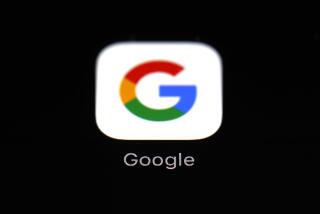France considers taxing Google and other Internet portals
- Share via
Reporting from Paris — The French government is mulling a so-called Google tax that it said would help level the playing field between Internet portals that offer free content and the music, film and publishing industries that lost revenue partly because of it.
“The world of culture is not only turned upside-down but profoundly threatened by the development of the Internet, and we hope that our action doesn’t intervene too late,” music producer Patrick Zelnik told the French daily Liberation on Thursday.
Zelnik co-led a government-commissioned report, published this week, that outlines programs to encourage buying books, music and films online rather than viewing them for free.
In a speech Thursday, French President Nicolas Sarkozy said he supported key initiatives among the 22 recommended in the Zelnik report.
Though he did not specifically call for a tax on portals such as Google, Yahoo, AOL and Facebook, as the report recommends, Sarkozy said that “the possibly dominant position Google has acquired in the online ad market” should be officially investigated for any unfair practices.
The commission called for such an investigation and even blamed Google and other “American giants on the Internet” for presenting “Europe and its cultural industries” with challenges by failing to share online ad profits with authors of the content.
One solution, the report said, is a “reasonable” tax both on the ad revenue earned by providers such as Google and on telecommunication firms, amounting to “a justified compensation for the advantages . . . [they] were able to draw from the development and the illegal exchanges of files on the Internet.”
The exact amount of the tax was not yet made clear, though the report estimates that the tax would generate nearly $30 million a year.
Google France’s public affairs director, Olivier Esper, told Liberation that he hoped the government would “favor cooperation” and warned against “prolonging a path of opposition between the Internet world and the world of culture, for example, through the path of taxation.”
“Let’s stop demonizing the Internet, and let’s look at the benefits provided by the Web,” said Christine Balague, co-president of a French Internet think tank Renaissance Numerique. “Neither the online portals nor the Internet providers steal from artists. On the contrary, they participate in the emergence of new and innovative economic models.”
The proposed taxes would specifically help fund programs, such as “music cards” for youth, making it cheaper for them to shop legally online for music, the report said.
Sarkozy said he supported the music card idea and added that the government would subsidize half the cost. Private firms also might help fund the cards, which would be aimed partly at introducing youth to legal means of downloading music.
The report recommended that another commission be formed to find ways to compensate newspapers for the free online content they provide.
Critics and some in the French media wondered whether a tax on companies based outside France could be implemented easily.
The report partly responded to those concerns, saying that Internet providers outside France could be taxed in the same way that “territorial rules are applicable to . . . conventions” outlining insurance costs to foreign companies outside France.
France’s ministry of culture must now review the report.
This year, a new French law imposes penalties for online piracy and Internet users who illegally download films and music.
“The state must act as a regulator” against the abuses of the Internet, said the report, which encouraged other European countries to follow France’s example.
Lauter is a special correspondent.






